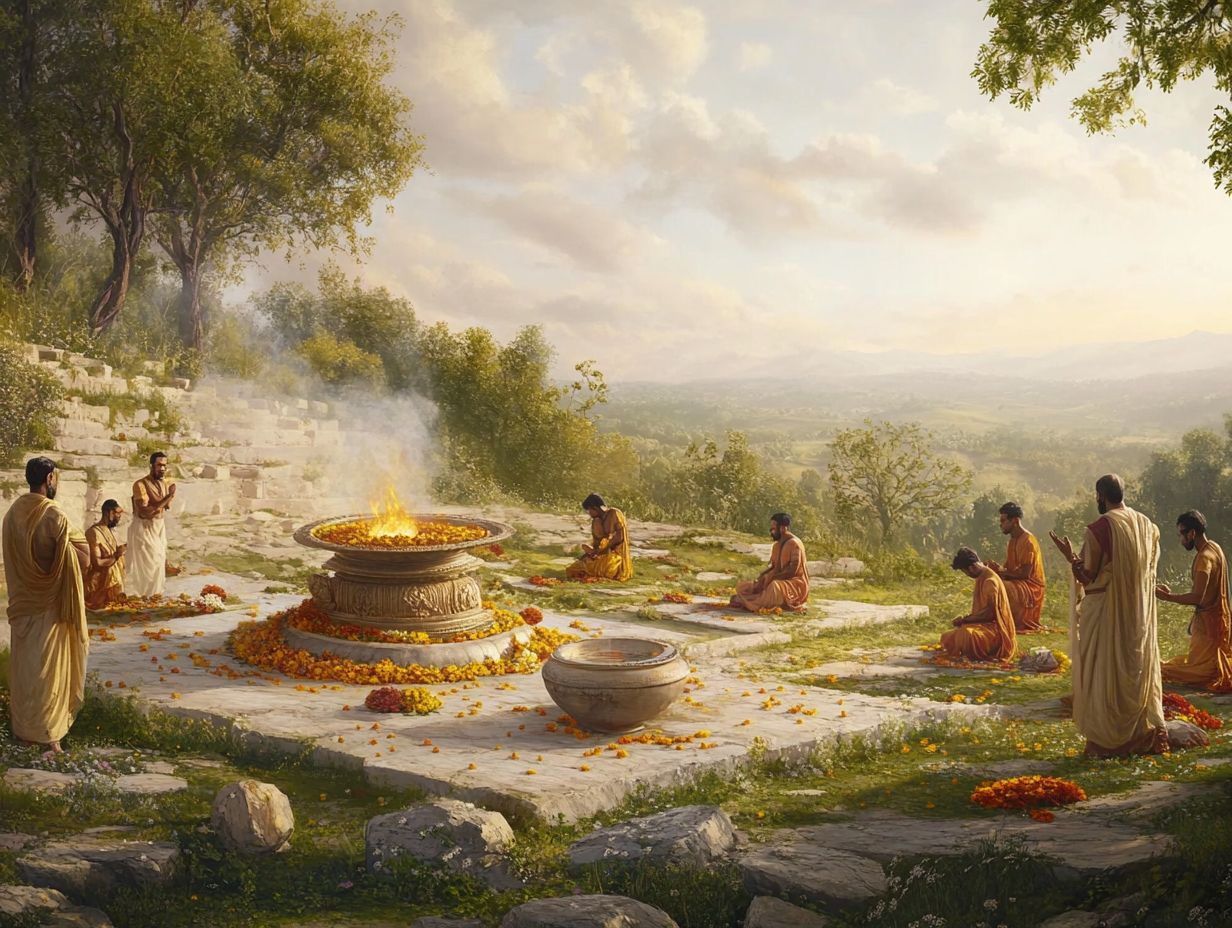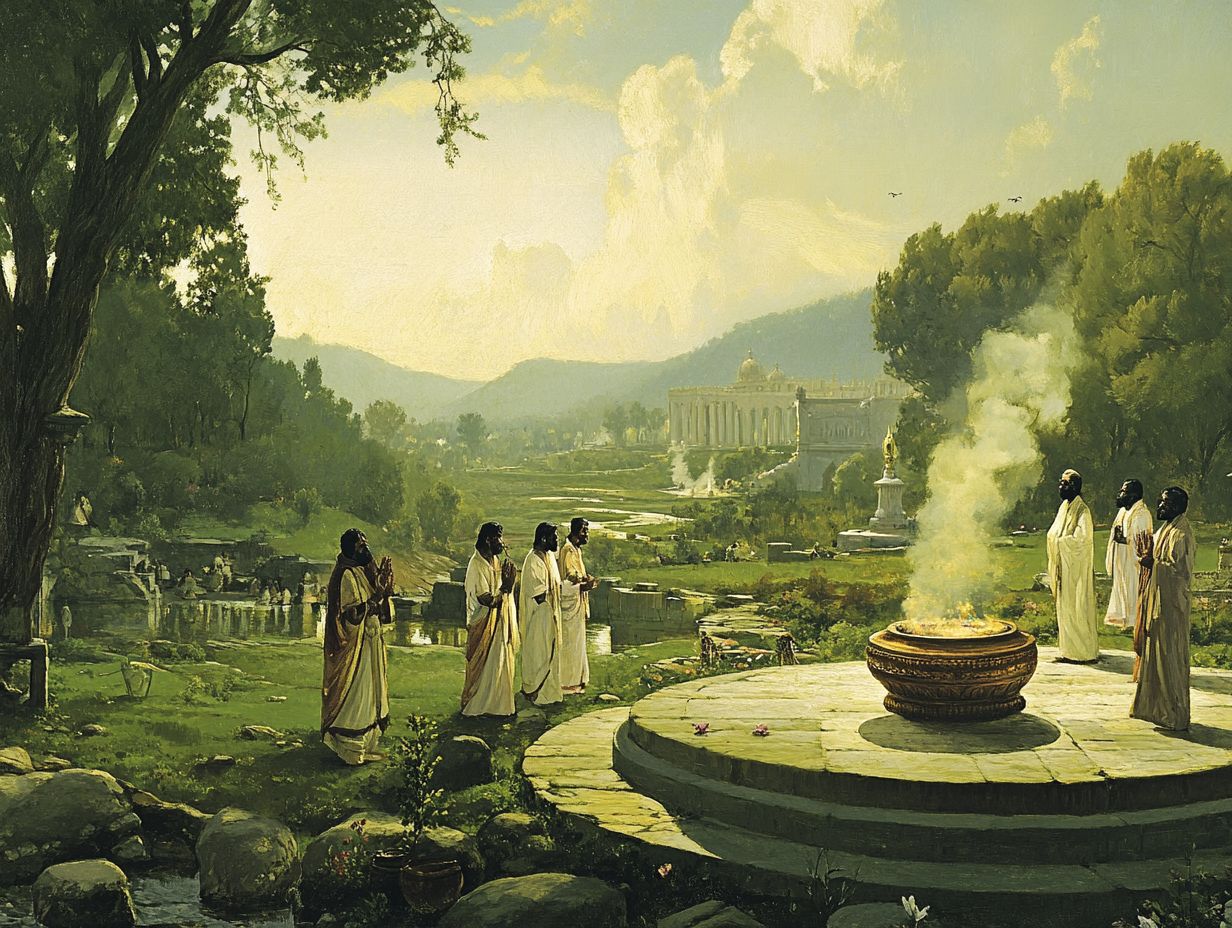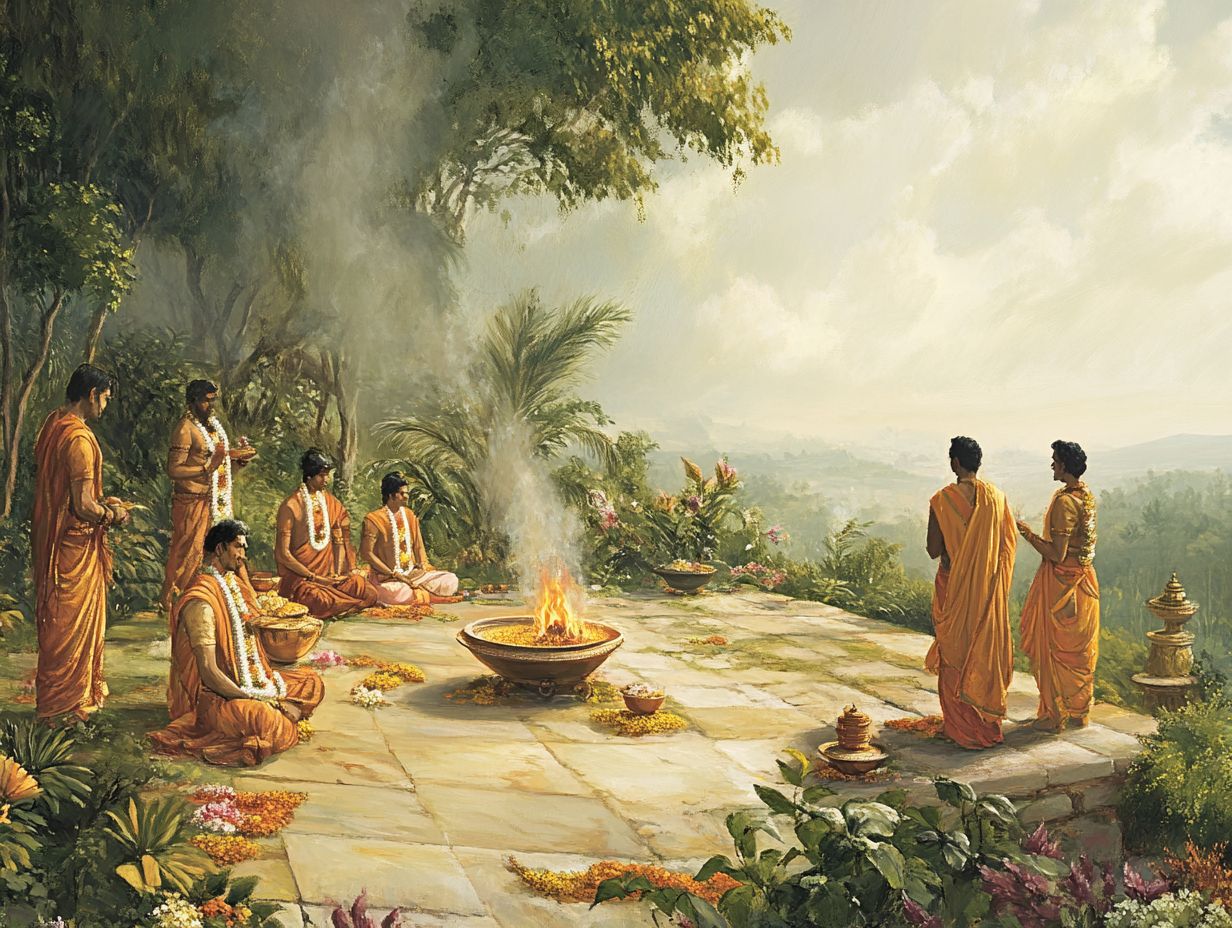What is Soma in Hinduism?
Soma occupies a significant and revered position within Hinduism, esteemed not only as a sacred plant but also as an emblem of divine connection and spiritual enlightenment.
This exploration delves into the origins and descriptions of Soma as articulated in ancient texts, illuminating its importance in various rituals and ceremonies, alongside the rich symbolism that envelops it.
Furthermore, the discussion investigates the effects of consuming Soma on both the mind and body, while also addressing the controversies and debates that have arisen surrounding its use in contemporary practices.
This enlightening journey invites a deeper understanding of the intricate tapestry of Hindu traditions associated with Soma.
What is Soma?

Soma, frequently regarded as a divine beverage in Hinduism, occupies a prestigious position within the ancient Vedic texts, where it is portrayed as an ambrosial elixir that bestows immortality and fosters a connection with the divine.
This mysterious substance is venerated not only for its psychoactive effects but also as a crucial component in a range of spiritual practices, rituals, and sacrifices aimed at appeasing the gods and deities.
Scholars have delved into its significance throughout Indo-Iranian mythology, attributing to Soma a symbolic representation of cosmic order and transcendence.
What are the Origins of Soma?
The origins of Soma can be traced to the esteemed traditions of Indo-Iranian cultures, where it was honored as a sacred drink deeply intertwined with ancient practices and rituals described in Vedic texts. This enigmatic substance served not only as a spiritual elixir but also as a symbol of the profound interconnectedness between the natural and divine realms.
Emanating from the highlands of Central Asia, the mythology surrounding Soma flourished within both Vedic and non-Vedic traditions, highlighting its significant role in cultural narratives. The ritualistic consumption of this offering was believed to confer immortality and divine wisdom upon its participants, prompting scholars to delve into the specific flora associated with its preparation.
Various theories propose that plants such as ephedra and the fly agaric mushroom may have been pivotal in these rituals, each contributing unique psychoactive properties that enriched Soma’s symbolic representation in ancient texts.
How is Soma Described in Hindu Texts?
In Hindu texts, particularly the Rigveda and the Brahmanas, Soma is illustrated with vibrant imagery that establishes it as a divine elixir, crucial for fostering communication with the gods during rituals and sacrifices.
This intriguing substance is frequently characterized as possessing transformative properties, bestowing immortality and enlightenment upon those who partake in it. Soma acts as an essential conduit between the earthly realm and the divine, facilitating connections with celestial beings during sacrificial rites.
The intricate descriptions found within these ancient scriptures emphasize Soma’s dual nature; it exists as both a tangible substance and an ethereal essence, symbolizing not only the rejuvenation of the body but also the elevation of the spirit.
In a symbolic sense, Soma is linked to the liberation of the soul, granting participants the ability to transcend mundane experiences and access higher planes of consciousness. The application of Soma within these sacred contexts undeniably underscores its revered status in Hindu spirituality.
What is the Significance of Soma in Hinduism?
The importance of Soma in Hinduism transcends its identity as merely a divine beverage; it embodies the pursuit of spiritual enlightenment, linking practitioners to a higher reality and the divine essence woven throughout the cosmos.
Central to numerous rituals and ceremonies, Soma acts as a vital conduit for divine communication, enhancing the spiritual journey through offerings and worship that invoke the presence of the gods.
What Role Does Soma Play in Hindu Rituals and Ceremonies?

Soma occupies a pivotal role in Hindu rituals and ceremonies, frequently featured in offerings to the gods during yajnas. It serves as a profound symbol of reverence and a heartfelt desire for divine blessings.
In these sacred rites, priests engage in the meticulous preparation of the Soma drink, derived from specific plants that are believed to possess divine qualities. The act of offering Soma is rich with symbolism; it signifies not only nourishment for the deities but also embodies a deep connection to agricultural cycles, underscoring the vital importance of fertility and abundance.
As the priests chant sacred mantras to invoke the presence of the gods, the Soma is poured into the sacred fires, facilitating a spiritual communion designed to summon prosperity, health, and harmony within the community. Each ritual highlights the cyclical nature of life and the intricate interdependence between humans and their environment, forging a profound bond between the divine and the earthly realms.
What Symbolism is Associated with Soma in Hinduism?
The symbolism associated with Soma in Hinduism encompasses profound themes of unity, cosmic connection, and spiritual health, often regarded as a bridge between the natural and divine realms. This divine elixir transcends the notion of a mere beverage; it serves as a manifestation of the interconnectedness of all life forms, reinforcing the bonds within communities and nurturing a sense of belonging.
As it nourishes individuals, Soma enriches holistic health, embodying the essential balance between body, mind, and spirit that is central to Hindu philosophical discourse. Its connections to agricultural cycles underscore the significance of nature’s rhythms, illustrating how the cultivation of crops mirrors the cyclical journey of life and spirituality. This relationship ultimately fosters a deeper appreciation for the divine interplay between humanity and the cosmos.
What are the Effects of Consuming Soma?
The effects of consuming Soma are frequently characterized as profound, exerting a significant influence on both the mind and body.
This experience often results in heightened consciousness and spiritual encounters that surpass the boundaries of ordinary perception.
How is Soma Believed to Affect the Mind and Body?
Soma is regarded as possessing distinctive effects on both the mind and body, often characterized as hallucinogenic in nature. It is said to promote altered states of consciousness that encourage deep introspection and a connection to the divine.
This powerful substance has been referenced in ancient texts, with historical accounts indicating its significance in various spiritual practices. Users frequently report experiences that enhance cognitive clarity, amplify sensory perception, and induce visual phenomena, which are often interpreted as mystical encounters.
Anecdotal evidence suggests that those who engage in these psychoactive experiences can access a heightened state of awareness, leading to profound insights regarding both the self and the universe. Such effects not only enrich individual journeys but also contribute to communal rituals, strengthening the sacred bond among participants as they explore their spirituality together.
What Spiritual Effects are Associated with Soma?

The spiritual effects associated with Soma consumption are profound, often leading practitioners to experiences of enlightenment, enhanced meditation, and a distinctive form of divine communication manifested through visions. This sacred nectar has been revered for centuries and is believed to unlock the pathways of consciousness, elevating the soul toward higher realms of existence.
Individuals who engage in this ancient ritual frequently describe moments of deep introspection, allowing them to delve into the intricacies of their inner selves. The transformative journey through these mystical experiences fosters a stronger connection with the divine, guiding them toward self-realization and a deeper understanding of their place in the cosmos.
By aligning the mind and spirit, the consumption of Soma can awaken dormant energies, resulting in a significant shift in perception and overall spiritual awareness.
Controversies Surrounding Soma in Hinduism
The controversies surrounding Soma in Hinduism arise from the ongoing debates concerning its historical significance, contemporary applications, and the psychoactive properties ascribed to it. These discussions have resulted in a variety of interpretations among scholars and practitioners, each offering their unique perspectives on this enigmatic substance.
Is Soma Still Used in Modern Hindu Practices?
In contemporary Hindu practices, the use of Soma may have waned, yet its cultural significance remains robust, often represented symbolically in rituals and offerings dedicated to the deities.
The essence of Soma, once a crucial element of Vedic rituals, now manifests in various forms, seamlessly blending ancient traditions with modern interpretations. Many devotees engage with modern representations of Soma through herbal concoctions and symbolic offerings, which resonate with the drink s original purpose of fostering a connection with the divine. This sacred drink, often referred to in Vedic hymns, symbolizes both ritualistic practices and spiritual awakening.
During contemporary festivals and pujas, the attributes of Soma are invoked to symbolize rejuvenation, spiritual awakening, and transcendent experiences, underscoring its enduring legacy. This evolution illustrates how the cultural heritage surrounding Soma continues to flourish, adapting to modern beliefs while preserving a profound reverence for its historical significance within Hindu traditions and Vedic culture.
What are the Debates and Criticisms Surrounding Soma?
Debates and criticisms surrounding Soma frequently center on its psychoactive properties and the diverse interpretations of its historical context within Hinduism and Vedic literature, resulting in polarized perspectives among scholars and practitioners alike. This contentious discourse mirrors a broader inquiry into the ways ancient rituals and substances can inform or intersect with contemporary spiritual practices.
Some scholars interpret Soma as a divine gift designed to elevate practitioners to heightened states of consciousness and ecstatic states, while others challenge its significance, positing that it may merely serve as a myth or metaphor within religious texts. This highlights the ongoing search for authenticity within spiritual experiences.
The implications of these varying interpretations extend into the realms of psychology, comparative religion, and spiritual enlightenment, sparking discussions about the relevance of ancient sacraments in today s quest for enlightenment.
As these interpretations evolve, they unveil a rich tapestry of beliefs that confront and expand our understanding of spirituality, transcendental states, and personal transformation.
Frequently Asked Questions

What is Soma in Hinduism?
Soma is a sacred plant that has been used in Hindu rituals for thousands of years. It is also known as the “elixir of immortality” and is believed to have divine powers. The mythology of Soma is deeply intertwined with its role as a divine beverage in Vedic ceremonies.
What is the significance of Soma in Hinduism?
In Hinduism, Soma is believed to be the drink of the gods, and drinking it is said to bring about various spiritual and physical benefits. It is also considered to be a symbol of purity and enlightenment.
How is Soma used in Hindu rituals?
Soma is typically consumed as a drink during religious rituals and ceremonies. It is offered to the gods, such as Indra and Agni, as a way to connect with them and receive their blessings. This ritualistic use is a key aspect of its significance.
Is Soma a hallucinogen?
There is some debate about whether Soma is a hallucinogenic plant. Some scholars suggest that it may have been a plant that had psychoactive properties, while others argue that it was a purely symbolic substance. The debate often involves discussions about the plant identification and the psychoactive effects attributed to Soma.
What is the origin of Soma in Hinduism?
The origin of Soma in Hinduism is a subject of much speculation and mythology. Some believe it was a physical plant, while others view it as a symbolic representation of the divine nectar of immortality. The Rigveda, one of the most ancient Hindu texts, offers extensive hymns and references to Soma as a celestial drink.
Is Soma still used in modern Hindu practices?
The use of Soma in modern Hindu practices is not as prevalent as it was in ancient times. However, it is still used in some rituals and ceremonies by certain sects and communities within Hinduism. These modern practices often emphasize the symbolism in rituals and the spiritual traditions associated with Soma.
